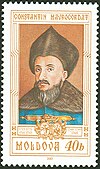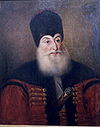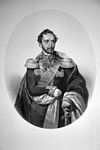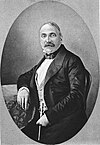This is a list of princes of Wallachia, from the first mention of a medieval polity situated between the Southern Carpathians and the Danube until the union with Moldavia in 1859, which led to the creation of Romania.
Notes
Dynastic rule is hard to ascribe, given the loose traditional definition of the ruling family. On principle, princes were chosen from any family branch, including a previous ruler's bastard sons, being defined as os de domn, "of Voivode marrow", or as having heregie, "heredity" (from the Latin hereditas); the institutions charged with the election, dominated by the boyars, had fluctuating degrees of influence. The system itself was challenged by usurpers, and became obsolete with the Phanariote epoch, when rulers were appointed by the Ottoman Sultans; between 1821 and 1878 (the date of Romania's independence), various systems combining election and appointment were put in practice. Wallachian rulers, like the Moldavian rulers, bore the titles of Voivode ("duke") or/and Hospodar ("lord, master"); when writing in Romanian, the term Domn (from the Latin dominus) was used.
Most rulers did not use the form of the name they are cited with, and several used more than one form of their own name; in some cases, the ruler was only mentioned in foreign sources. The full names are either modern versions or ones based on mentions in various chronicles.
List
Early rulers
House of Basarab
From the early 15th-century the family was divided in two main branches:
| Ruler | Portrait | Years | Marriage | Notes |
|---|---|---|---|---|
| Radu Negru | 
|
c. 1290 – 1310 | Unknown | Radu Negru is legendary voivode of Wallachia; some historians consider it to be just a nickname of Thocomerius or Basarab I. |
| Basarab I the Founder (Basarab I Întemeietorul) |
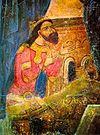
|
c. 1310 – 1352 | Margareta two children |
Son of Thocomerius; first non-legendary ruler of Wallachia. |
| Nicolae Alexandru | 
|
1352 – 16 November 1364 | Maria Lackfy five children Clara Dobokai two children Margareta Dabkai no children |
Son of Basarab I; he was already co-ruling with his father since 1344. |
| Vladislav I Vlaicu-Vodă |

|
16 November 1364 – 1377 | unknown | son of Nicolae Alexandru |
| Radu I | 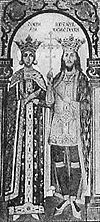
|
1377 – 1383 | Anna one child Kalinikia c.1354 or 1355 two children |
Son of Nicolae Alexandru. |
| Dan I | 1383 – 1386 | Maria of Serbia one child |
Son of Radu I. After his death, his descendants formed the Danesti family. | |
| Mircea I the Elder (Mircea I cel Bătrân) |

|
23 September 1386 – November 1394 January 1397 – 31 January 1418 |
Maria Tolmay six children Anca no children |
Son of Radu I. Wallachia reached one of its peaks. He was deposed by a usurper, Vlad, in 1394, but was restored in 1397. |
| Vlad I the Usurper (Vlad I Uzurpatorul) |
November 1394 – January 1397 | Unknown | Second son of Dan I, usurped the throne. | |
| Mihail I | 
|
31 January 1418 – August 1420 | unknown two children |
Son of Mircea I, co-ruled with his father since 1415. |
| Radu II the Bald (Radu II Praznaglava) |

|
August 1420 – October 1422 December 1426 – March/June 1427 |
unknown | War of succession in Wallachia, which opposed Radu II, brother of Mihail I, to the Danesti pretender Dan II (son of Dan I and member of the Order of the Dragon), where both had brief periods of power in succession. |
| Dan II the Brave (Dan II cel Viteaz) |

|
October 1422 - December 1426 March/June 1427 - 1 June 1431 |
unknown five children | |
| Alexandru I Aldea | 1 June 1431 – December 1436 | unknown | Son of Mircea I, ousted Dan II of the throne. | |
| Vlad II the Dragon (Vlad II Dracul) |
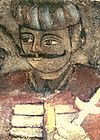
|
December 1436 – 1442 1443 – 7 December 1447 |
Unknown one child Cneajna of Moldavia three children |
Illegitimate son of Mircea cel Bătrân; member of the Order of the Dragon (thus Dracul); While in negotiations outside Wallachia with the Ottoman Empire, his son Mircea was named prince. He returned to the throne in 1443, winning against John Hunyadi, and deposing also Basarab II. He was assassinated in 1447. His descendants, from his sobriquet, founded the Draculesti family. |
| Mircea II the Younger (Mircea al II-lea cel Tânăr) |
September – December 1442 |
Unmarried | Son of Vlad II Dracul, sometimes not counted; he ruled while his father was absent, on his way to pay the tribute to the Ottoman Empire; Deposed by John Hunyadi. Returned in 1446, co-ruling with his father. He was blinded and buried alive by Hunyadi in 1447. | |
| Basarab II | 1442–1443 | Maria (Dobra) two children |
Son of Dan II; Placed in the throne by John Hunyadi, in war with Vlad II. | |
| Vladislav II | 
|
7 December 1447 – 20 August 1456 | Neacşa one child |
Son of Dan II; supported by John Hunyadi, Regent of Hungary; The way he came to the throne is debatable, but the most accepted is that he killed Vlad II, and was then replaced in the throne by Hunyadi. Returned in 1448, after deposing Vlad the Impaler, and ruled again until his death in a combat hand-to-hand against Vlad III, who retook the throne |
| Vlad III the Impaler (Vlad Țepeș) |
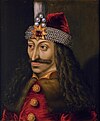
|
20 August 1456 – July 1462 June 1476 - January 1477 |
Unknown one child Justina Szilágyi Between 1475 and 1476 no children |
Son of Vlad II Dracul, invaded briefly Wallachia in 1448 (October–November) while Vladislav II was away. His real rulership would begin after killing Vladislav II in battle. Vlad III was at war against the Ottomans. |
| Radu III the Fair (Radu cel Frumos) |

|
August 1462 – November 1473 23 December 1473 – March 1474 March - bet. June/September 1474 October 1474 – January 1475 |
Maria one child |
Son of Vlad II Dracul; from 1473 in war with Basarab III. |
| Basarab III Laiotă the Old (Basarab Laiotă cel Bătrân) |

|
November - 23 December 1473 March 1474 bet.June/September - October 1474 January1475 - June1476 |
Unmarried | Son of Dan II; In war against Radu III. |
| Basarab IV The Young Impaler (Basarab IV Țepeluș cel Tânăr) |
December 1477 – September 1481 November 1481 – 23 March 1482 |
Maria one child |
Son of Basarab II. His first reign was briefly contested by:
| |
| Vlad IV the Monk (Vlad Călugărul) |

|
September - November 1481 23 March 1482 – November 1495 |
Rada Smaranda Before 1460 four children Maria Palaiologina 1487 one child |
Son of Vlad II. |
| Radu IV the Great (Radu cel Mare) |

|
November 1495 – 23 April 1508 | Catherine of Zeta 1494 four children |
Son of Vlad IV. |
| Mihnea I the Bad (Mihnea cel Rău) |

|
23 April 1508 – 29 October 1509 | Smaranda no children Voica three children |
Son of Vlad III. Abdicated to his son. Died 1510. |
| Mircea III the Dragon (Mircea III Dracul) |

|
29 October 1509 – 26 January 1510 | Maria of Serbia 1519 two children |
Son of Mihnea I. |
| Vlad V the Younger (Vlad cel Tânăr) |
8 April 1510 – 23 January 1512 | Anca of Zeta Before 1508 one child |
Son of Vlad IV; also known as Vlăduț | |
| Neagoe Basarab | 
|
23 January 1512 – 15 September 1521 | Milica of Serbia 1505 six children |
Possibly son of Pârvu Craiovescu (Craiovești family) or Basarab IV; The most accepted theory is that he claimed the throne as a son of Basarab IV, being in fact son of Pârvu. It's possible that the matter arose from the fact that Neagoe's mother was a mistress of Basarab IV. Cultural zenith in Wallachia. |
| Regency of Milica of Serbia (15 September - December 1521) | Under regency of his mother. His rule was briefly challenged by:
Teodosie was defeated in 1521, fled with his mother, and died in exile the following year. | |||
| Teodosie | 
|
15 September - December 1521 | Unmarried | |
| Radu V of Afumati (Radu de la Afumati) |

|
December 1521 – April 1523 19 January - June 1524 September 1524 – April 1525 August 1525 – 2 April 1529 |
Voica of Bucsani three children Ruxandra of Wallachia After 1525 no children |
Son of Radu IV; allied with the Craiovești. |
| Vladislav III | April - 8 November 1523 June - September 1524 19 April - August 1525 |
Unknown | Nephew of Vladislav II. | |
| Radu VI Bădica | November 1523 – 19 January 1524 | Unknown | Illegitimate son of Radu IV. | |
| Basarab VI | 6 January - 5 February 1529 | Unknown | Non-dynastic; Son of Mehmed-bey. | |
| Moise | 
|
January 1529 – June 1530 | Unknown | Son of Vladislav III. Last of the Dănești. Deposed, died 29 August of that same year. |
| Vlad VI the Drowned (Vlad Înecatul) |

|
June 1530 – September 1532 | Anna of Moldavia 1531 no children |
Son of Vlad V. |
| Vlad VII Vintilă de la Slatina | 
|
September 1532 – 10 June 1535 | Zamfira one child Rada one child |
Illegitimate son of Radu IV. |
| Radu VII Paisie | 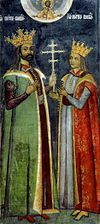
|
10 June 1535 – 1545 | Stana three children Ruxandra of Wallachia c.1541 three children |
Son of Radu IV. Had to face some very brief boyar usurpations or mere attacks to his sovereignty:
|
| Mircea IV the Shepherd (Mircea Ciobanul) |

|
January 1545 – 16 November 1552 11 May 1553 – 28 February 1554 24 December 1557 – 25 September 1559 |
Chiajna of Moldavia June 1546 seven children |
Son of Radu IV. |
| Radu VIII Ilie the Cowherd (Radu Ilie Haidăul) |
16 November 1552 – 11 May 1553 | Unknown | Son of Radu V. Deposed; died 1558. | |
| Pătrașcu the Good (Pătrașcu cel Bun) |

|
28 February 1554 – 24 December 1557 | Voica of Slatioare four children |
Son of Radu VII. |
| Regency of Chiajna of Moldavia (25 September 1559 - 1564) | Son of Mircea IV. Deposed and died in exile in the following year. | |||
| Petru I the Younger (Petru cel Tânăr) |

|
25 September 1559 – 8 June 1568 | Jelena Crepovic of Transylvania 22 August 1563 one child | |
| Alexandru II Mircea | 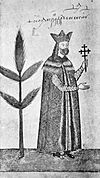
|
8 June 1568 – 11 September 1577 | Catherine Salvaresso 1558 Pera one child |
Son of Mircea III Dracul; popularly called Oaie Seacă (Barren Sheep). His rule was briefly challenged by:
|
| Regency of Catherine Salvaresso (11 September 1577 - July 1583) | Initially under regency of his mother, both were deposed by the usurper Petru Cercel. Mihnea paid for the assassination of his usurper, returned and ruled alone. In 1591, he was deposed and died in exile in Constantinople, in 1601. | |||
| Mihnea II the Turk (Mihnea Turcitul; Mehmet Bey) |

|
11 September 1577 - July 1583 6 April 1585 – 19 May 1591 |
Neaga de Cislau June 1582 three children | |
| Petru II of the Earring (Petru Cercel) |
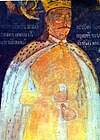
|
July 1583 – 6 April 1585 | Unmarried | Son of Pătrașcu; deposed Mihnea II, but ended up assassinated by his order. |
House of Basarab, with interventions of Bogdan-Muşat and Movilești dynasties
| Ruler | Portrait | Years | Family | Notes |
|---|---|---|---|---|
| Ștefan I Surdul (Stephen the Deaf) |
1591–1592 | Bogdan-Muşat | ||
| Alexandru III cel Rău (Alexander III the Bad) |
1592–1593 | Bogdan-Muşat | also ruled Moldavia (1592) | |
| Mihail II Viteazul (Michael II the Brave) |
 |
1593–1600 | Drăculești | according to some, the illegitimate son of Petru Pătrașcu cel Bun; also ruled Transylvania (1599–1600) and Moldavia (1600), briefly bringing the three principalities under a personal union. |
| Nicolae Pătrașcu |  |
1599–1600 | Drăculești | Son of Michael II, co-ruled with his father since 1599. |
| Simion Movilă |  |
1600–1601 1602 |
Movilești | |
| Radu IX Mihnea |  |
1601–1602 1611 1611–1616 1620–1623 |
Drăculești | son of Minhea II Turcitul |
| Radu X Șerban |  |
1602–1610 1611 |
Nephew of Neagoe Basarab. 1st rule | |
| Transylvanian occupation: direct rule of Gabriel Báthory (1611) | ||||
| Gabriel Movilă | 1616 1618-1620 |
Movilești | son of Simion Movilă | |
| Alexandru IV Iliaș | 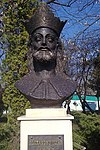 |
1616–1618 1627-1629 |
||
| Alexandru V Coconul (Alexander the Child-Prince) |
 |
1623–1627 | Drăculești | son of Radu Mihnea |
| Leon Tomșa |  |
1629–1632 | ||
| Radu XI Iliaș | 1632 | |||
| Matei Basarab |  |
1632–1654 | Brâncovenești | |
| Constantin I Șerban |  |
1654–1658 | illegitimate son of Radu Șerban | |
| Mihnea III |  |
1658–1659 | ||
Pre-Phanariote period
The Ottoman influence in the Wallachian rulers' election grows from the mid-17th century onward. From 1659, the rulers elected are mostly scions of Greek families, and increasingly less linked to the original Wallachian ruling family. The process reached its peak with the called Phanariote period (1715-1859), where, between the rulers, there was already no connection (or a very distant one) with the dynasty of Basarab.
Various dynasties
| Ruler | Portrait | Years | Family | Notes |
|---|---|---|---|---|
| Gheorghe Ghica |  |
1659–1660 | Ghica | |
| Grigore Ghica I |  |
1660–1664 1672–1673 |
Ghica | |
| Radu Leon |  |
1664–1669 | ||
| Antonie Vodă din Popeşti | 1669–1672 | |||
| Gheorghe Ducas |  |
1673–1678 | ||
| Șerban Cantacuzino |  |
1678–1688 | Cantacuzene | |
| Constantin Brâncoveanu |  |
1688–1714 | Brâncovenești | |
| Ștefan Cantacuzino |  |
1714–1715 | Cantacuzene |
Phanariotes (1715–1821)
Post-Phanariote period
See also
Bibliography
- Constantin Rezachevici (2001). Cronologia critică a domnilor din Țara Românească și Moldova: a. 1324-1881. Editura Enciclopedică. ISBN 9734503863.
- Treptow, Kurt W. (2000). Vlad III Dracula: The Life and Times of the Historical Dracula. The Center of Romanian Studies. ISBN 973-98392-2-3.
References
- Constantin Rezachevici - "Critical chronology of the lords of Wallachia and Moldova a. 1324 - 1881", Volume I, Enciclopedic Publishing House, 2001, p. 86

